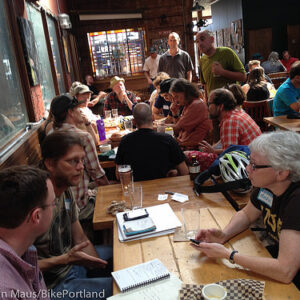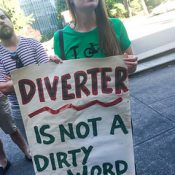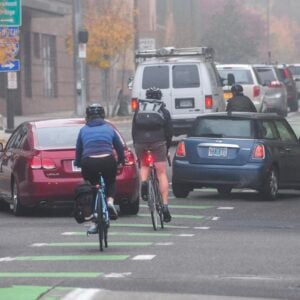
(Photos: Jonathan Maus/BikePortland)
This post was written by Bike Loud leaders Hami Ramani (@hamiramani), RJ Sheperd (@rjsheperd), and Kiel Johnson (@kiel_by_bike).
Change is coming to Portland’s bicycle advocacy scene. Bike Loud PDX is adapting to become a more effective and more vocal force to shape Portland’s bicycling policy. This month we are launching our first neighborhood chapters, which will bring Bike Loud PDX to the local level and onto the streets.
Inspired by the successful Seattle Neighborhood Greenways, we are starting three local neighborhood chapters, SE/East, NE/North, and West Portland. Since our founding seven years ago, we have learned that local people know what their neighborhood needs to become a better place to ride. These chapters will empower those local advocates and provide energy for citywide efforts.
Advertisement
“There is a deep urgency that informs our efforts. The climate crisis is happening right now and we need an all hands on deck approach if we are going to make this a world that dramatically limits greenhouse gas emissions.”
Three successful months of Pedalpalooza show that there are still lots of people in Portland who care deeply about bicycling and how it can make this city a better place. We hope to harness some of that energy to reverse the trend of our stagnant bicycle numbers.
In an effort to center community and the most efficient and low impact mode of travel – the bicycle! – we have organized weekly rides to the Saturday PSU Farmers Market and a monthly NE Portland farmers market ride over the past ten months. These rides have become a respite for many folks seeking an all-ages and all-abilities way to get out and safely engage with Portland and Portlanders. Our rides are explicitly about supporting local farmers, makers and bakers while helping advocate for safer streets for all road users.
Advertisement
Through this experience we hope to activate a broad group of people who use their bikes/trikes to move about town. We want to see these Portlanders empowered to make changes at the hyper-local level to help affect policy at a citywide (or countywide) sphere.
There is a deep urgency that informs our efforts. The climate crisis is happening right now and we need an all-hands-on-deck approach if we are going to make this a world that dramatically limits greenhouse gas emissions. We will focus on building partnerships with all groups connected to addressing climate change and we will have a strong presence in our region’s conversations around how we adapt to a world with a changing climate.
The power of the Black Lives Matter movement has highlighted the deep-rooted inequities in our society. We are committed to working for improved transportation equity and access to a high quality citywide bike network that allows people to conveniently move around on the cheapest and most efficient mode of transportation available, the bicycle.
And we need you!
BikePortland is an important component of building knowledge and connecting people to the stories of how bicycling makes people’s lives better. Our aim is to create a space beyond the virtual world for people to use that knowledge to make their community a better place. We hope you will join us and follow along as we fight to make Portland the best place to ride a bike in the world. We are currently looking for new board members to help steer this next chapter. If you are interested email bikeloudpdx@gmail.com.
We need your passion and energy. Please join our newsletter and stay informed about our activism.
— Hami Ramani, RJ Sheperd, Kiel Johnson
— Get our headlines delivered to your inbox.
— Support this independent community media outlet with a one-time contribution or monthly subscription.








Thanks for reading.
BikePortland has served this community with independent community journalism since 2005. We rely on subscriptions from readers like you to survive. Your financial support is vital in keeping this valuable resource alive and well.
Please subscribe today to strengthen and expand our work.
Are you all interested in guerilla activism or is it just more talk? I’m done with PBOT but I’d be down to help haybale bike lanes and build traffic diverters and traffic calming features in my neighborhood.
Maybe you all could also pressure JM and bikeportland to apply a more critical lens to PBOT? It’s frustrating when low-value, non evidence-based ‘experimental’ infrastructure gets cheerlead-ed here because of the idea, I’m assuming, that something is better than nothing.
Bike and pedestrian advocates should view things like the 80 new beg barrels and unprotected gutter lanes on Tillamook as failures of PBOT and treat those projects like they the failures they are. I’m not really personally interested in being part of organizations that are happy to settle for the scraps that represent the current status quo.
Abolish the BAC and PAC, as PBOT ignores them anyway. Try instead to establish an informal, non-confrontational, but regular dialog with PBOT and ODOT mid-level engineers instead, so everyone can understand how administrative decisions are made and why.
Build a coalition with your natural allies: the neighborhood associations and local realtors, who all basically want what you want, but for different reasons.
I’m confused by this statement. Neighborhood associations are often the ones protesting any alterations to driving patterns, e.g. bike lanes on Hawthorne or protecting the Lincoln/Harrison greenway when it crosses major streets, subservient to blinkered business owners and righteous property owners.
And realtors seem to usually be in the mindset of “more parking means a higher sales price” and are thus shocked at the idea of losing free on-street vehicle storage for something like a safer street. They might mention a neighborhood’s walking score, but I don’t see listings advertising that a property is on a greenway or near a MUP. (Though admittedly I’m not in the market for a house.)
But maybe I’m missing obvious counterexamples. Who are these neighborhood associations and realtors advocating for multiple safe modes of transit?
Groups like Bike Loud need allies and unholy alliances in order to connect with the powers that be, or to at least mitigate or neutralize the opposition.
Realtors want safe well-connected neighborhoods for walkers and bicyclists, who are more likely to pay a premium for houses in such neighborhoods. It’s all about sales and profits. Realtors are well-connected with business associations and builders.
NAs want highly livable safe neighborhoods to walk their dogs, ride their clunky bikes slowly, reduce crime, improve the perception of their neighborhoods, increase land values, and get more neighbors to participate in events and projects. It’s all about what the folks serving on the NA boards want, rather than their non-serving neighbors. NAs are well-connected with elected officials and generalized nonprofits like United Way.
As with any ally, there’s a certain amount of self-interest and cynicism, including car parking, boat parking, wanting freeways, etc. That’s why they make good allies rather than fast friends.
Of course, with the Street Trust as friends, who needs allies?
My NA was very involved in getting bicycle facilities in our area. We provided data (traffic studies, video), feedback on the design, and facilitated interactions between PBOT and the neighborhood. We put a lot of work into it.
There are what, a hundred something?, NAs in the city. The people I know on the SW NAs are pretty pro-bike.
Literally all the NAs I know in inner SE (Buckman, HAND, Richmond, Creston-Kennilworth, Brooklyn) are all at least moderately pro-bike. There may well be some backwards NAs in Portland (there are 95 of them, after all) but the idea that NAs are, as a whole, anti-bike just isn’t borne out by the facts. It’s an outdated stereotype that harms our ability to build alliances.
NAs do tend to support bike infrastructure that places bikers “over there” away from collectors/arterials/shopping districts. On the other hand, any infrastructure that inconveniences prius/subaru/bmw/merc/tesla drivers (e.g. diverters) provokes instant and fierce NA backlash. And free parking for homeowners (but not dirty “no skin in the game” renters) remains the absolute third rail of NA politics.
One of the best things Chloe Eudaly tried to accomplish was her attempt to undercut the entrenched NIMBYism of these racist, classist, and fundamentally undemocratic local government orgs.
It seems like one of the goals of these chapters should be to increase participation in the NIMBY associations by folks who want bike facilities. I feel like progressives always want to be Mayor, Governor, Senator, or President.
PBOT and the CoP generally uses the NIMBY associations as an excuse to veto projects they don’t want to do in the first place. Taking away that veto would be really useful.
IMO, PBOT actually uses the NAs and other advisory committees as a convenient rubber stamp for what they wanted to do in the first place, and they really don’t have to ‘veto’ projects that they aren’t already undertaking.
It probably depends. PBOT “engaged” my community about the beg barrels they are putting on N Central by presenting at a NA meeting. The NA was supportive because the beg barrels, of course, don’t do anything to discourage motorized traffic or slow motorist down. I imagine if PBOT wanted to kill actual traffic diverters, they’d go to the NA and hear about the traffic-geden that would occur if real traffic diverters were put in and use it as an excuse to scale back the project and try out some more ‘experimental’ traffic calming measures.
Not sure about the “beg barrels”, but the new concrete barriers only seem to interfere with safe riding, not with driving. They’re basically an annoyance, and I wish they had “engaged” my neighborhood so I could have asked for something different… though I’d be shocked to learn of any changes PBOT made to their plans for this as a result of any outreach they did.
Can any PBOT insiders point out any specific ways in which public input shaped the final plan? And did any neighborhoods actually endorse this plan?
Feels like you’re thinking that NAs have a lot more power than they really do. But I agree that in many neighborhoods (especially the non-inner neighborhoods) it’s not hard to get on the NA board and help guide the direction of transportation in the neighborhood.
FWIW, if there’s one thing I regret from Healthier Hawthorne, it’s not doing a much better job presenting to neighborhood associations. I naively/arrogantly assumed they would mostly be “on my side,” and that the benefits of protected bike lanes on Hawthorne would be self-evident, but that wasn’t really the case. Many members of the Richmond and Hosford-Abernathy NAs seemed to *want* to support better bike infrastructure, but weren’t convinced the tradeoff of fewer travel lanes and subsidized personal vehicle storage would be worthwhile. What I *should* have done is make a really slick, persuasive Powerpoint presentation (or video) touting the climate/social/health/business/transportation/affordability/etc. benefits of bike lanes, included a lot of detail about proven best practices, research/powerful graphs to back it up, etc. And stories from relatable local people about how biking changed their life. Pathos/logos/ethos. BikeLoud should definitely invest some resources in persuading neighborhood and business associations to go “all-in” on bike infrastructure–radicalizing them could go a long way, and right now they’re not getting the full story from anyone–certainly not from PBOT.
David,
Your comment awhile back has always resonated with me about creating ‘unholy alliances’.
Portland is a city that wants to progress forward on a vision of livability, sustainability, and prosperity. Unifying on how we get there and who it impacts is where we spend 95% of our discussion.
At the same time, PBoT and CoP really do want to create a people priority network and shift in transportation. There’s so much potential to get things going. But time and time again, its a form of NIMBY, or the ‘what about parking’ voices that the city confronts in every discussion or community input. Every time.
That being said, I get surprised where I have found allies. Folks within NAs, business districts, religious groups, PTAs, and yes: even people within the bureaucracy. We need to make sure within these groups: the many allies and bike-users voices are heard. The city is looking for community input all the time. Lets make sure its the right input.
All together I’m hoping we can be more exploratory in where we find allies to amplify and support. So when hyper-local, district-wide, or even city-wide discussions are being made: we know we have allies who can speak for biking in this city.
PS. For other folks reading: There’s always room for tactical projects. I know the dust is barely being blown off with current projects at BL. But if you have a project in mind: We can support it. Join us in our next meeting and lets talk! I know many people who are interested:)
I run a 501c3 nonprofit called the Transit Alliance of the Piedmont – transitalliancepiedmont.org – we are really small, much smaller than Bike Loud. Our focus is tactical urbanism, but not the type like City Repair, more the type that convenes different groups into the same room for a common project. Our latest venture is on Thursday Sept 23rd in the afternoon at a Greensboro downtown city park, a public workshop out in the open due to covid restrictions. With our regional realty association co-sponsoring the event, we’ll have a bunch of public agencies, nonprofits, universities, DOTs, transit providers, police, advocates, realtors, and many others discuss and brainstorm how to coordinate our $200 million in regional ARPA funds – covid stimulus – towards transportation projects that help connect our regional residents to better jobs and housing choices. No one locally or in NC has done this before, have a tactical urbanist workshop outdoors. If this works, we’ll do the same in Winston-Salem in October.
My point is that to bring about positive change, you have to risk failure, but you also have to build and sustain unholy alliances with others. You have to bring into the discussion not just your allies, but also the organizations you typically think oppose you or your point of view. We are already the fiscal sponsor of our tiny local version of Bike Loud; we’ve already worked successfully with realtors on several workshops since 2016; and we are good partners with both of our public universities, with numerous bike organizations and nonprofits, and with our regional government, through a series of past projects and workshops; plus a bit of luck and a lot of goodwill. But now we are bringing in our local versions of PBOT, TriMet, ODOT, PBA, the Street Trust, our county (who run both the public schools and the prison) and various elected officials.
Each time we do a public workshop, our alliances keep growing, and we get a bit more progressive bike stuff in the process. But it is a lot of work, a lot of sweat-equity. This is something I learned from participating with the East Portland Action Plan organization from 2009-2015 plus a collective local willingness to take risks.
No offense meant, but would you consider a redo on the name? As someone who agrees with much of your agenda, the name is off-putting and gives vision to obnoxious activist antics, naked bike rides, guerilla vigilantism, etc. I think you’d get a lot more traction with a re-brand that could help build the kind of alliances David mentioned. Something like Bike Unity has a warmer, less hostile ring to it.
Policy question – how do you reconcile the need of low-income people to have access to affordable, low-impact bicycle transportation with the apparent propensity of the PDX houseless community to harbor many camps visibly engaged in bike theft, dismantling and the resale black market?
Sigh. I appreciate that activism sometimes needs to devolve to the neighborhoods. Small-scale experimentation, blah, blah, blah… But why is Portland ALWAYS so goddamn neighborhoody?! (This is coming from someone who was born and raised here)
This trend – at times – works against efforts to create big-thinking coalitions that move beyond narrow interest groups. I am inspired by activism in other cities like Chicago (see https://insideclimatenews.org/news/16082021/sustainable-transportation-cycling-bus-public-transit-cars-courtney-cobbs-chicago/) where people are uniting the push for more street space and resources for transit AND bikes – in the same breath!
The car and fossil fuel industries are too big and too powerful to sequester by ourselves in the ‘bike lobby’. In my world, Bike Loud would team up with the Portland Bus Lane Project and leverage/form relationships with BBPDX, the Street Trust, and OPAL to bring the vision of the Bike Plan together with the Rose Lane Project build out. And it wouldn’t just be about building things – it would be about culture change.
Hell, maybe we could win a youth and senior free transit pass for the region (like OPAL has been pushing for) or boost needed transit service and frequency in the most transit-dependent corners of our region. And, oh yeah, we could demand full electrification of our bus fleet. No small feat.
And in the process we could sideline and maybe even grab resources at the State level that would have otherwise gone to highway widening/expansion. That would be something to dream and write about… Until then, I guess we will just read about the neighborhoody one-off’s, local street squabbles, and the like.
-Ted
“But why is Portland ALWAYS so goddamn neighborhoody?!”
1. A retreat towards localism is easier and far less stressful than fighting for systemic change.
2. Portlanders involved in advocacy tend to be economically comfortable and as a result have a vested interest in incrementalism.